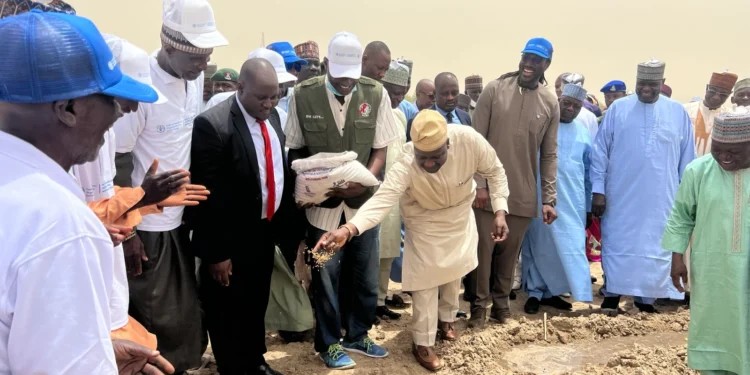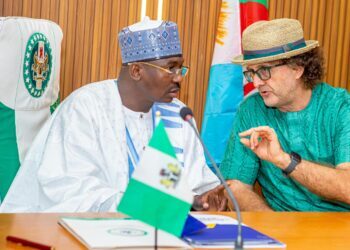The Food and Agricultural Organisation (FAO) says it is supporting 26,750 vulnerable households in the North-East with productive agriculture assets to rebuild their lives and livelihoods.
Mr. Dominique Kouacou, the FAO Representative ad-interim in Nigeria and to ECOWAS, stated this on Monday at the launch of the 2024 Rainy Season Input Distribution in Maiduguri, with the theme, “Good Prospects for Improving Food Security’’.
Kouacou disclosed that no fewer than 9,975 households in Borno state would benefit from the FAO intervention
He said that the support by FAO would help the households to mitigate the escalating food insecurity and build resilience of returnees in their settled communities.
“It is our expectation that these interventions will improve food production, income generation and build resilience among conflict-affected returnee households,’’ he said.
Kouacou said the gesture was in fulfillment of his commitment to support Nigeria to strengthen the resilience capacity of displaced persons.
“You will recall that a few months ago in Abuja, the Minister of Agriculture and Food Security, while presenting the result of the March 2024 harmonised food security analysis for 26 states and the FCT noted that 31.8 million people in the analysed states were in a food insecurity situation.
“Out of the projected population, 4.84 million people are in Borno, Adamawa and Yobe states.
“The report shows an increase in the number of people projected to experience high acute food insecurity compared to the 4.4 million reported during the October 2023 analysis.
“All the vulnerable populations require protection, interventions in addition to food, livelihood, and nutrition assistance,” he said.
He added that FAO had been implementing extensive programme targeting IDPs, returnees and host communities in the three states most affected by conflict in the northeast.
“FAOs vision of zero hunger as highlighted by the SDG2 guides our intervention through procurement and distribution of nutrient dense vegetables, cereals, and legume quality seeds and NPK fertilizers.
“We are doing these with the funding support from four financing partners, including the Governments of Norway, United States of America, Switzerland, and the European Commission,” he said.
Also speaking, Alhaji Bawu Musami, the Commissioner for Agriculture and Natural Resources said that the occasion was one of the yearly events of FAO, characterised with distribution of crop production inputs to farmers.
Represented by, Bulama Gana, Permanent Secretary of the Ministry, the commissioner said that the program also aimed at curtailing problems faced by farmers in accessing agricultural inputs.
He recalled that the state government recently released 312 tractors and implements for the 2024 wet season in order to increase food production and ensure food security
The commissioner said the machines were to cultivate farmlands in all the accessible farms across the State free of charge.
On his part, Borno Governor, Babagana Zulum, acknowledged the strategic role being played by FAO, particularly in assisting victims of insurgency and to bring about viable and sustainable peace and security in the state.
Represented by his Deputy, Alhaji Usman Kadafur, the governor said his administration would continue to solicit the cooperation of international organisations in addressing the multifarious challenges of development confronting the state.
“As you are aware, Borno State is essentially an agrarian state and the majority of the people are engaged in various aspects of agricultural activities.
“The distribution of these crop production inputs will therefore encourage our farmers to be more determined in engaging in farming activities.
“Agricultural production is one of the cardinal policies of our Ten-Pact Agenda, which has been strategically captured in the 25-year Development Plan and the 10-year Strategic Transformation Initiative.
“This administration is therefore ever ready and willing to improve, not only the overall agricultural productivity in the State, but also to enhance the general standard of our rural farmers who constitute the majority of our teeming population.
“In order to achieve this objective, there is a compelling need for governments at all levels to collaborate with our international partners in working hard to end the humanitarian crises caused by the insurgency in our State,’’ he said.
The governor assured that his administration would continue to mobilise its scarce resources in ensuring that youths were given the opportunity to develop themselves for self-employment. (NAN)











